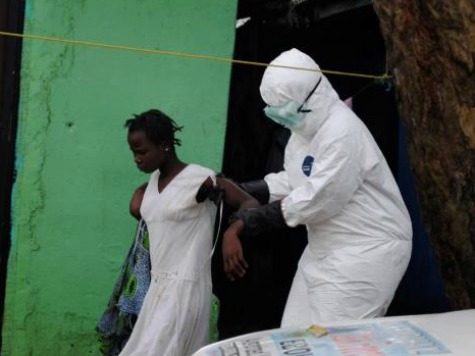
In an extensive piece detailing the efforts to provide increased medical care in Liberia, the Wall Street Journal notes that soldiers coming to Liberia to help build makeshift medical facilities and train doctors and nurses are finding that they cannot build infrastructure at a pace fast enough to keep up with the spread of the virus.
According to the newspaper, the goal of the troops on the ground is to get 70% of Liberian and Sierra Leonean Ebola patients in a clinic or hospital bed and out of the general population. Currently, 18% of patients are believed to be receiving professional medical attention. What is more, official statistics indicate that the number of deaths attributable to Ebola have doubled in only one month, meaning the number of cases is also growing exponentially.
Efforts currently include the construction of health centers and organization of medical materials. The latter is far more complicated than it appears, as the Wall Street Journal notes that medical records are kept in large, often disorganized binders in rarely-inhabited rooms:
The files on most of Liberia’s Ebola cases are stored in three-ring binders on a shelf in an abandoned World War II-era chimpanzee testing lab, filled with bats. That is where the U.S. Army Medical Research Institute of Infectious Diseases conducts blood tests for Ebola. A small three-ring binder holds all the case files from April 15 to Aug. 12. A binder twice that size holds the files from just five days in late September.
Such woefully unorganized infrastructure would require weeks, if not months and years, to organize into an efficient system, something experts say is barely if at all possible. Given the accelerated rate of contamination in the past month, many are expecting the American efforts to be too little, too late. Speaking to USA Today, Anthony Fauci, director of the National Institute of Allergy and Infectious Diseases, considered among the top experts on the subject internationally, warned that even the current response is “inadequate.” “If we have a lot of motion but no action, a lot of signing of resolutions with no resources, it’s not going to happen,” he warns. “We’re not going to control it.”
While opposition to Western medicine has also been an obstacle in combatting the disease, the Journal notes that many are welcoming the American military as potentially the only hope to eradicate the disease. “We want the U.S. Army to take over this entire situation,” said one man watching the construction of a medical facility in a swampy field. Another local resident expressed a similar sentiment to Voice of America: “Seeing them, sometime we’re pleased for us to see the U.S. Army in this country for them to help to fight the Ebola virus.”
Still, the Liberian government is working to combat rumors that the U.S. military has arrived in the country for nefarious reasons unrelated to Ebola. One common misconception, reports Liberia’s FrontPageAfrica, is that the Americans have come to overthrow President Ellen Johnson Sirleaf. The situation has become such that the U.S. Ambassador to Liberia, Deborah Malac, issued a public statement assuring Liberians that the U.S. military had not arrived to stage a coup against their president:
They’re not here as a show of force; they’re not here to push against or change the government. I want to be very, very clear; everybody laughs and thinks that we’re not serious, but I know that conversation is going on out there and I want to be clear. They’re here to help us fight Ebola […]
I don’t want to see anywhere in any newspaper or hear on any radio station that the US military has come in because the US government has a secret plot to overthrow the government here in Liberia; that is absolutely not true.

COMMENTS
Please let us know if you're having issues with commenting.